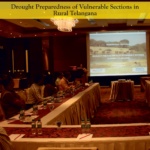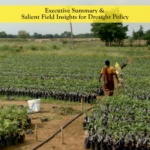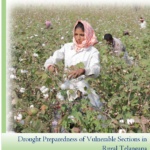The dissemination workshop for the project Drought Preparedness of Vulnerable sections in Rural Telangana, was organised on the 22nd December 2017. The workshop brought together an unlikely group of disciplinary and institutional backgrounds in an interdisciplinary engagement. The participants included members from government research think-tanks and training organisations in rural development and disaster management, academics, civil society organisations working at the grassroot levels, government officials at the state policy level as well as officials of line departments at the district and mandal level. The rich debates with regard to methodology between sciences, social sciences, policy, extension, as well as implementation brought to the forefront the various challenges as well as potential methods of doing interdisciplinary research in the field of ‘Drought’ which is a highly multisectoral issue. It also brought out the importance of understanding the gaps between policy statements, intents, and implementation in local contexts to better inform policy recommendations.
The study was divided into two distinct but linked phases. This document provides the brief highlights for each of these phases: the theoretical and analytical outcomes, as well as key observations for the field that have particular relevance for drought policy implementation and access.
The drought policy environment emanates from sectors of disaster management, water, agriculture, climate change, environment, rural development, food security and health. The definitions and discourses of droughts in government policy reflect the ways in which the problem and significance of droughts is understood by policy. This lens through which the problem is understood determines the ways in which policy responds to it. In recent years there is a weakening of the deterministic link of droughts with rainfall failure and strengthened link with water scarcity, which has created a space, at the very root, for a greater role of policy in creating and ameliorating droughts. Droughts are experienced differently by varied geographies and socioeconomies. Spatially there is a non-linear and imperfect linkage between rainfall deficiency, agriculture failure, and drinking water distress which needs to be taken into account in policy thinking, Also, while some sections are able to cope better during droughts, vulnerable sections suffer disproportionately due to their lower resilience to reduced incomes and poor quality of access to resources.



